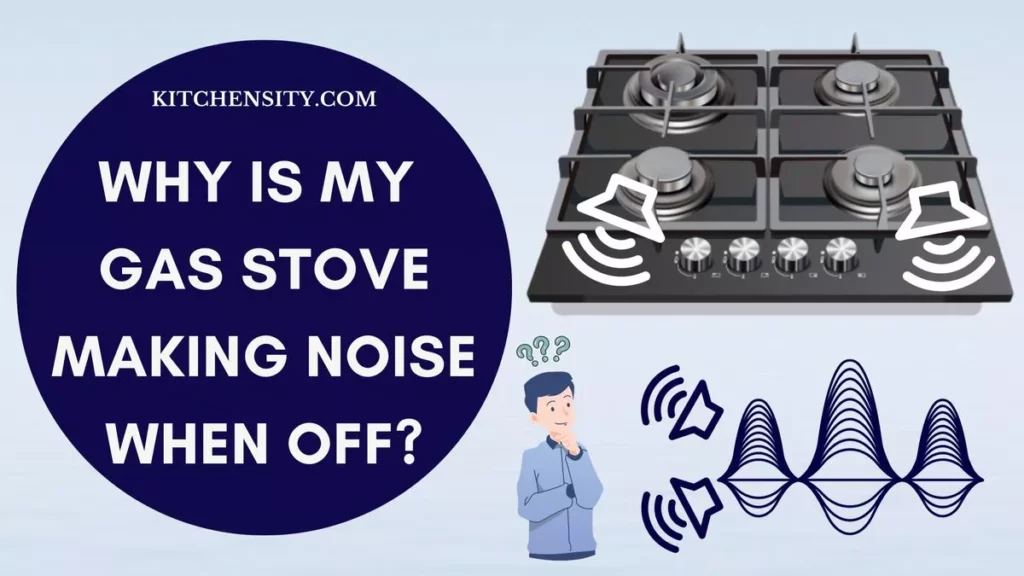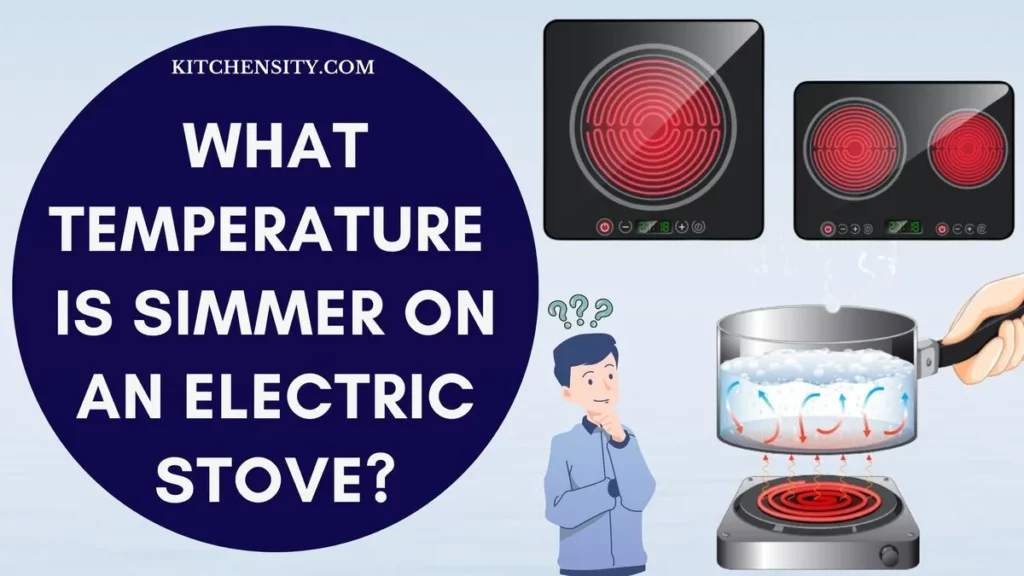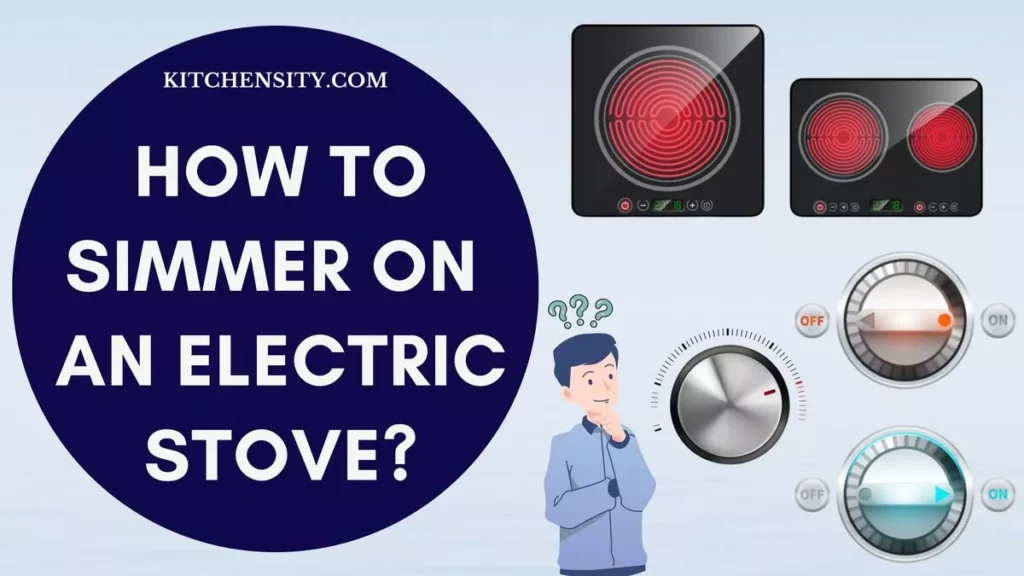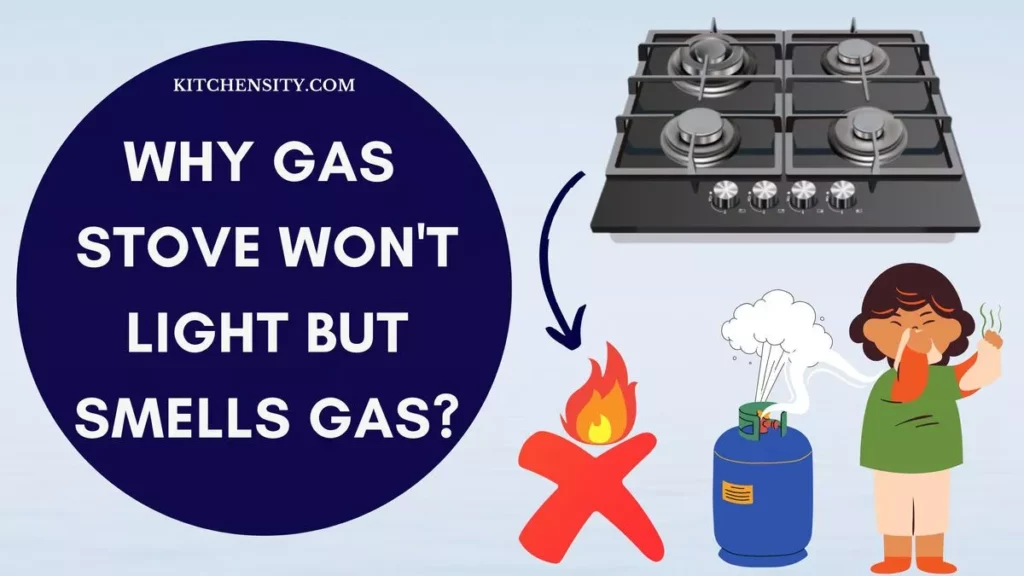Gas stoves, an essential kitchen companion, offer efficient cooking solutions. However, it can be disconcerting when these appliances produce strange noises even after being turned off.
In this article, we unravel the mystery behind these puzzling sounds, exploring the possible reasons and providing practical solutions. Understanding the causes is the first step toward a safe and noise-free kitchen environment.
Let’s delve into the world of gas stoves and decode the enigma of their unexpected noises.

Table of Contents
- 1 Why Is My Gas Stove Making Noise When Off?
- 2 Understanding The Basics: How Do Gas Stoves Work?
- 3 Possible Causes Of Gas Stoves Making Noise When Off
- 4 How to Fix a Gas Stove That Is Making Noise When It Is Off?
- 5 Is It Normal For A Gas Stove To Make Noise?
- 6 What To Do If My Stove Keep Making These Noises?
- 7 Why Is My Electric Stove Making Noise?
- 8 What Preventive Measures Can We Take To Prevent This Noise?
- 9 Final Thoughts: Why Is My Gas Stove Making Noise When Off?
- 10 Frequently Asked Questions (FAQs)
- 10.1 Can I Ignore Minor Noises From My Gas Stove?
- 10.2 My Gas Stove Is Making Popping Noise When On
- 10.3 How Often Should I Schedule Maintenance For My Gas Stove?
- 10.4 Is It Safe To Use My Gas Stove If It’s Making Noise?
- 10.5 What Should I Do If I Smell Gas Near My Stove?
- 10.6 Can I Fix Gas Stove Issues On My Own?
Why Is My Gas Stove Making Noise When Off?
Your gas stove may make noise when off due to potential gas leaks, faulty regulators, or issues with the thermocouple. Gas leaks can cause hissing or whistling sounds, indicating a serious hazard. Faulty regulators or malfunctioning safety components like thermocouples can also lead to persistent noises, requiring immediate professional inspection and repair to ensure safety and prevent further complications.
Also Read – How To Fix A Pilot Light On A Gas Stove?
Understanding The Basics: How Do Gas Stoves Work?
To comprehend why your gas stove is making noise, it’s crucial to understand its basic functionality.
Gas stoves use natural gas, which is released through burners. When you turn on a burner, the gas mixes with the surrounding air in the presence of a spark or pilot light. This mixture creates a controlled flame. The size of the flame can be adjusted using the stove’s knobs, allowing you to regulate the temperature for cooking.
The burner is designed with small holes where the gas and air mix, creating a consistent and even flame. This flame provides heat to the cookware placed on the burner, enabling you to cook food. When you turn off the stove, the gas flow is halted, extinguishing the flame and ending the cooking process.
Also Read – How To Fix The Gas Stove Igniter Not Sparking After Cleaning?
Possible Causes Of Gas Stoves Making Noise When Off
When a gas stove makes noise even when it’s turned off, several reasons could be responsible for this puzzling issue. Here’s a detailed explanation of these potential causes:
- Gas Leakage: One of the most serious concerns is a gas leak. Even when the stove is turned off, a leaking gas pipe or valve can result in a hissing or whistling noise. Gas leaks are extremely dangerous as they can lead to fire or explosions. If you suspect a gas leak, it’s crucial to immediately evacuate the area, avoid any open flames or electrical devices, and contact emergency services.
- Faulty Regulator: The regulator is a vital component that controls gas flow to the stove. If the regulator malfunctions, it can cause irregular gas flow, leading to strange noises. Regular maintenance and prompt replacement of a faulty regulator are essential to ensure the proper functioning of your gas stove.
- Thermocouple Issues: Gas stoves have a safety feature called a thermocouple, which detects the presence of a flame. If the thermocouple is faulty, it might fail to shut off the gas completely, resulting in odd sounds. Replacing a malfunctioning thermocouple is necessary to resolve this problem.
- Residual Gas Pressure: After turning off the stove, residual gas pressure can keep the burner lit at a very low level. This lingering flame might produce faint noises. Proper cleaning and ventilation can help alleviate this issue, ensuring that the gas completely dissipates after use.
- Sediment Buildup: Over time, gas lines can accumulate sediment, obstructing the gas flow and causing noise. Regular cleaning and maintenance of gas lines can prevent sediment buildup, ensuring smooth gas flow and a quiet stove operation.
- Expansion And Contraction: Metal components within the gas stove naturally expand and contract due to temperature changes. These movements can produce creaking or popping sounds. While these noises are usually harmless, they might be mistaken for a problem. Understanding the natural processes within your stove can help differentiate between normal sounds and issues that require attention.
Addressing these potential causes promptly and efficiently is essential to ensure the safety and proper functioning of your gas stove. Regular maintenance and professional inspections can help identify and resolve these issues, ensuring a quiet and safe kitchen environment.
Also Read – Why Is My Gas Stove Not Clicking?
How to Fix a Gas Stove That Is Making Noise When It Is Off?
If your gas stove is making noise even when it’s turned off, it’s important to address the issue promptly to ensure safety and proper functioning. Here’s a step-by-step guide on how to fix a gas stove that is making noise when it is off:
- Ensure Safety First:
- Evacuate The Area: If you suspect a gas leak, evacuate the area immediately. Open windows and doors to ventilate the space.
- No Open Flames: Do not use any open flames, including matches or lighters, and avoid using electrical devices, as they can trigger a spark.
- Identify The Source:
- Check For Gas Smell: If you smell gas, it’s a clear indication of a leak. If you don’t smell gas but still hear noise, proceed with caution as the issue might be internal.
- Listen: Pay close attention to the type of noise the stove is making. Hissing sounds typically indicate a gas leak, while mechanical or popping sounds might be caused by internal components.
- Check Gas Connections: Examine all visible gas connections, hoses, and valves for signs of wear, corrosion, or damage. Any leaks in these components could lead to unusual noises.
- Inspect Burners: Clean the burners and inspect them for any blockages or debris. Clogs in the burner holes can cause irregular gas flow, resulting in noise.
- Look for Residue: Check for any residue or signs of gas around the stove. Residue can indicate a gas leak.
- Use Soapy Water: To detect gas leaks, mix water with dish soap and apply it to the gas connections. If bubbles form, it indicates a leak. This method helps identify even minor leaks that might not be visible to the naked eye.
- Inspect The Stove:
- Look For Visible Leaks: Check the gas hose, connections, and valves for any visible signs of damage or leaks. If you find a leak, it’s essential to call a professional technician to repair it.
- Remove Burners: Take off the burners and clean them thoroughly. Use a brush or compressed air to clear any debris or food particles that might be clogging the burner holes. Blocked holes can cause irregular gas flow, leading to noise.
- Clean The Burners: Residual gas pressure can keep burners lit at a low level, causing noise. Ensure the burners and surrounding areas are clean and free of debris. Use a brush or compressed air to clean out any clogs in the burner holes.
- Clean The Cooktop: Wipe down the cooktop surface to remove grease, spills, or residue. Any residue around the burners can affect their performance and contribute to unusual sounds.
- Check The Regulator And Thermocouple:
- Regulator Inspection: A faulty regulator can cause irregular gas flow and noise. If you suspect an issue with the regulator, it’s best to call a certified technician to replace it.
- Thermocouple Examination: The thermocouple is a safety device that detects the presence of a flame. If it’s malfunctioning, it can cause the gas valve not to shut off completely, leading to noise. A professional technician can assess and replace the thermocouple if necessary.
- Look For Loose Parts: Open the stove’s top panel (if applicable) and check for any loose or displaced parts inside the stove. Loose components can vibrate and cause rattling or buzzing noises.
- Test The Burners:
- Turn On Each Burner: One at a time, turn on each burner to its highest setting. Observe the flame. It should be a steady blue flame with a defined shape. If it’s yellow or flickering, there might be an issue with the air-gas mixture.
- Listen For Abnormal Sounds: While the burners are on, listen for any hissing, popping, or sputtering sounds. These noises can indicate irregular gas flow or a clogged burner.
- Inspect The Ignition System: Inspect the igniters for signs of wear or damage. Faulty igniters can cause clicking or sparking sounds even when the stove is off. Replace any damaged igniters to ensure proper functioning.
- Consult The Manual: If you are uncertain about any component or its functionality, consult the manufacturer’s manual. It provides specific information about the stove’s parts and their maintenance.
- Call A Professional Technician: If you cannot identify the source of the noise or if you suspect internal issues, it’s crucial to call a qualified technician. Gas appliances should only be inspected and repaired by professionals to ensure safety.
Remember, the safety of you and your household is paramount. If you encounter a gas-related issue that you’re unsure about, always seek help from qualified professionals.
Also Read – Why Gas Stove Won’t Light But Smells Gas?
Is It Normal For A Gas Stove To Make Noise?
Gas stoves can produce some noise during operation, which is often normal and nothing to worry about. Common sounds include a hissing noise as the gas flows, a clicking sound when the igniter sparks to light the burner, and a gentle whooshing sound as the flame ignites. These noises are part of the stove’s regular functioning and usually indicate that the stove is operating as intended.
However, there are specific types of noises that might be cause for concern:
- Hissing Sounds When Off: If your gas stove is hissing even when it’s turned off, this could indicate a gas leak. Gas leaks are dangerous and should be addressed immediately. Evacuate the area and contact a professional technician or emergency services.
- Loud Popping Or Banging Noises: Unusual popping or banging sounds can be due to irregular gas flow or dirty burners. These noises might signal a need for cleaning or maintenance to ensure proper combustion.
- Continuous Clicking: If the stove’s igniter keeps clicking even after the burner is lit, it might suggest a faulty ignition switch. While not immediately dangerous, it can be annoying and should be repaired to prevent wear on the igniter.
- Rattling Or Vibrating Noises: Internal components can sometimes become loose, leading to rattling or vibrating sounds. While not an emergency, these noises might indicate a need for internal adjustments or repairs to prevent further damage.
While some noise is normal during the operation of a gas stove, any unusual or persistent noises, especially when the stove is turned off, should be investigated. It’s always better to err on the side of caution and have a professional technician inspect the stove if you are unsure about the sounds it is making.
Regular maintenance and prompt repairs can ensure the safe and quiet operation of your gas stove.
Also Read – How To Fix A Yellow Flame On A Gas Stove?
What To Do If My Stove Keep Making These Noises?
If your gas stove is making unusual noises, it’s important to address the issue promptly to ensure safety and prevent potential problems. Here’s what to do if your stove is making specific noises:
- If Making a Humming Noise:
- Check the Regulator: A humming noise could indicate a faulty regulator. If you suspect an issue with the regulator, it’s best to call a certified technician to inspect and replace it if necessary. Do not attempt to fix this issue on your own.
- If Making a Ticking Noise:
- Inspect the Igniter: A continuous ticking noise might suggest a faulty igniter. Turn off the stove and ensure the igniter is clean and positioned correctly. If the noise persists, consider calling a technician to replace the igniter.
- If Making a Sparking Noise:
- Ensure Proper Burner Placement: If sparking noises occur when the stove is on, it might indicate a misaligned burner. Turn off the stove, realign the burner cap and base properly, and ensure there are no obstructions. If the issue persists, contact a technician for further inspection.
- If Making a Buzzing Noise:
- Check for Loose Parts: A buzzing noise might be caused by loose internal components. Turn off the stove and carefully inspect it. If you find any loose parts, contact a technician for proper adjustments and repairs.
- If Making a Clicking Noise:
- Inspect the Knobs: Clicking sounds can sometimes result from loose or faulty knobs. Ensure all knobs are in the off position. If the noise continues, it might be due to worn-out internal parts. Call a technician to assess and replace the affected components.
- If Making Popping Noises When Off:
- Inspect for Residue: Popping noises can occur due to residual gas pressure. Ensure the stove and burners are thoroughly cleaned to remove any residue. If the noise persists, it could be a sign of a minor gas leak. Conduct a soapy water test on the connections; if you find bubbles, there might be a leak. In this case, evacuate the area and call emergency services immediately.
Remember, gas-related issues should be handled by qualified professionals. If you are unable to identify or resolve the problem, it’s always safer to call a certified technician. Your safety and the safety of your household should be the top priority when dealing with gas appliances.
Also Read – Orange Flame On The Gas Stove: Causes And Fixes
Why Is My Electric Stove Making Noise?
If your electric stove is making unusual noises, it can be concerning. Here are some common reasons why your electric stove might be making noise:
- Expansion And Contraction: The metal components in an electric stove expand and contract as they heat up and cool down. This natural process can sometimes cause creaking or popping noises. These sounds are generally harmless and occur as the stove elements heat and cool.
- Faulty Burner: If you hear a buzzing or humming noise, it might be due to a faulty burner or heating element. This could indicate a loose connection or a damaged element. A buzzing noise can also occur if the element is not sitting correctly on its socket.
- Loose Parts: Vibrations during operation can cause loose parts, such as screws or panels, to rattle. Inspect the stove for any visible loose components and tighten them to eliminate the noise.
- Fan Issues: Some electric stoves have built-in fans for cooling. If the fan motor is malfunctioning, it can produce a clicking, buzzing, or humming sound. This issue requires professional repair or replacement of the fan motor.
- Faulty Switches: The switches that control the stove’s functions can wear out over time, leading to buzzing or clicking noises. If you hear these sounds coming from the control panel, it might be due to faulty switches that need replacement.
- Electrical Issues: If your stove is making crackling or popping sounds, it could indicate an electrical issue. This might be caused by a faulty wiring connection, which can be hazardous. If you suspect an electrical problem, it’s crucial to turn off the stove and contact an electrician immediately.
- Stove Coil Issues: If you have a coil-style electric stove, the coils can sometimes warp or become misaligned. This misalignment can lead to clicking or popping noises during operation.
Also Read – Why Electric Stoves Take Forever To Boil Water?
If your electric stove is making unusual or persistent noises, it’s advisable to:
- Turn Off The Stove: Ensure the stove is turned off and unplugged to avoid any accidents or injuries.
- Inspect Visible Parts: Check the stove for visible signs of damage, loose components, or misaligned burners.
- Contact A Professional: If you cannot identify or fix the issue yourself, it’s best to contact a professional appliance technician. They have the expertise to diagnose the problem accurately and perform necessary repairs safely.
Remember, your safety is paramount. Avoid using the stove if you suspect any electrical or mechanical issues and seek professional assistance promptly.
Also Read – How To Properly Vent A Gas Stove?
What Preventive Measures Can We Take To Prevent This Noise?
Preventing unusual noises from your gas stove, especially when it’s turned off, involves regular maintenance and cautious usage. Here are some preventive measures you can take to avoid such issues:
- Regular Cleaning:
- Clean Burners: Remove burners and clean them regularly to prevent clogs. Use a brush or compressed air to clear any debris in the burner holes.
- Clean Cooktop: Wipe the cooktop surface after each use to remove spills and grease. Residue around burners can affect their performance and lead to noise.
- Proper Ventilation: If your kitchen has a ventilation hood, use it while cooking. Proper ventilation helps disperse any gas fumes and prevents lingering odors or noise caused by residual gas pressure.
- Scheduled Maintenance: Schedule an annual inspection by a certified technician. They can identify and resolve potential issues before they escalate, ensuring your stove operates quietly and safely.
- Mindful Usage:
- Avoid Slamming Cookware: Avoid slamming pots, pans, or lids onto the stove. Vibrations from such impacts can displace internal components and lead to rattling or buzzing noises.
- Handle Knobs Gently: Turn the knobs gently when adjusting the flame. Rough handling can wear out internal parts, causing irregular gas flow and noise.
- Quick Repairs: If you notice any unusual noise or smell of gas, address the issue promptly. Delaying repairs can lead to more significant problems and compromise your safety.
- Educate Household Members: Ensure everyone in your household is aware of gas safety. Teach them how to identify gas smells and unusual noises and emphasize the importance of reporting such issues immediately.
- Install A Gas Detector: Consider installing a natural gas detector in your kitchen. These devices can detect gas leaks and alert you, providing an additional layer of safety.
- Follow The Manufacturer’s Instructions: Always follow the manufacturer’s guidelines for usage, cleaning, and maintenance. Adhering to these instructions ensures the proper functioning of your stove.
Also Read – Brass Burners Vs Cast Iron Burners
Final Thoughts: Why Is My Gas Stove Making Noise When Off?
In conclusion, the mysterious noises emanating from a gas stove, even when it’s turned off, can be a cause for concern and confusion. Understanding the underlying causes is essential for ensuring safety and resolving the issue effectively.
We’ve explored various reasons behind these perplexing sounds, ranging from gas leaks and faulty regulators to issues with thermocouples and residual gas pressure. While some noises are harmless, others signify potential hazards, demanding immediate attention.
- The key takeaway is the importance of regular maintenance and vigilance. By keeping the stove clean, checking for loose components, and scheduling annual professional inspections, homeowners can mitigate the risk of unusual noises and potential dangers.
- Additionally, being mindful of gas safety protocols, promptly addressing issues, and seeking expert help when needed is fundamental to maintaining a safe kitchen environment.
Remember, any suspicion of a gas leak or persistent, unfamiliar noises should be treated as emergencies. In such cases, swift evacuation and contacting emergency services are imperative.
By staying informed, proactive, and safety-conscious, homeowners can enjoy the convenience of gas stoves without the worry of unexpected noises, ensuring their kitchens remain hubs of both comfort and security.
Also Read – What Is An Infrared Gas Stove?
Frequently Asked Questions (FAQs)
-
Can I Ignore Minor Noises From My Gas Stove?
While some noises are harmless, it’s advisable to investigate any unfamiliar sounds to rule out potential issues.
-
My Gas Stove Is Making Popping Noise When On
A popping noise from your gas stove while it’s on could indicate debris or food particles trapped in the burner. Cleaning the burner thoroughly and ensuring proper ventilation can resolve this issue and maintain safe stove operation.
-
How Often Should I Schedule Maintenance For My Gas Stove?
Annual maintenance is typically sufficient, but if you notice any problems, don’t hesitate to call a technician.
-
Is It Safe To Use My Gas Stove If It’s Making Noise?
It’s best to refrain from using the stove until a professional technician has inspected and resolved the issue to ensure safety.
-
What Should I Do If I Smell Gas Near My Stove?
Evacuate the area, do not use open flames or electrical devices, and immediately contact emergency services.
-
Can I Fix Gas Stove Issues On My Own?
Minor issues like cleaning can be DIY, but any complex problems, especially involving gas, should be handled by professionals for safety reasons.
🔧 Stove Expert | 🔥 Gas Guru | 🏠 DIY Enthusiast | 🎨 Painter Extraordinaire
John Davis is your go-to source for all things stoves, from expert repairs to maintenance tips. With a deep understanding of gas systems, including natural and propane, John ensures your kitchen stays cooking safely. His passion for DIY home and kitchen projects shines through his stunning paint transformations. Trust John to bring warmth and functionality to your home, one stove at a time.






